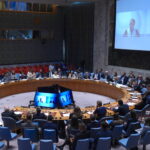Azerbaijan's national energy company, SOCAR, finalized its purchase of a 10% stake in Israel's Tamar gas field

Leon Neal/Getty Images
President of Azerbaijan Ilham Aliyev arrives at the 6th European Political Community summit on May 16, 2025 at Skanderbeg Square in Tirana, Albania.
Following the Israel-Iran ceasefire and amid questions about the extent of the damage Israel and the U.S. inflicted on the Islamic Republic’s nuclear program, an important piece of news flew under the radar: Azerbaijan’s national energy company, SOCAR, finalized its purchase of a 10% stake in Israel’s Tamar gas field.
The deal and its timing amid hesitation from other countries that have considered investing in Israel, reflect a growing strategic partnership between Jerusalem and Baku — one that has garnered increasing pressure from Iran toward Azerbaijan.
The day after the ceasefire between Israel and Iran was announced toward the end of last month, Union Energy, owned by Israeli businessman Aharon Frenkel, received the final approval from Israel’s Petroleum Council and Competition Authority to sell half its shares of the gas field in the Mediterranean, which provides 60-70% of Israel’s electricity each year, to Azerbaijan’s SOCAR. Chevron owns 25% of the Tamar field and the UAE’s Mudabala owns an 11% stake.
Jerusalem and Baku have had relations since 1992, soon after the latter’s independence from the Soviet Union, and in 2023, Azerbaijan became the first Shi’ite Muslim-majority country to open an embassy in Israel.
Azerbaijan supplies as much as two-thirds of Israel’s oil, and Israel was the largest supplier of arms to Azerbaijan from 2016-2020. Israel continued to sell drones and missiles to Baku during its war with Armenia over the disputed Nagorno-Karbach region in 2020, as well as satellites and a missile-interception system in 2023, during another war between Azerbaijan and Armenia.
A 2009 U.S. diplomatic cable posted on Wikileaks described cooperation between Israel and Azerbaijan in terms that are still apt today: The relationship between Jerusalem and Baku is “an iceberg; nine-tenths of it is below the surface,” the cable stated.
Azerbaijan also shares a 475-mile border with Iran. The cable noted that “much like Israel, Azerbaijan perceives Iran as a major, even existential security threat, and [for] the two countries, cooperation flows from this shared recognition … Even open sources have identified an extensive relationship between the countries’ intelligence services … and it only stands to reason that this remains a major area of cooperation, which both sides naturally seek to downplay.”
Some parts of that relationship have surfaced: for example, that Israel smuggled Iran’s archive out via Azerbaijan in 2018.
Three years ago, Azerbaijan’s president, Ilham Aliyev, during a time of tensions with Iran, staged a photo-op of himself stroking an Israeli attack drone, after Tehran accused Baku of allowing Israel to “establish its presence in several regions of Azerbaijan.”
There had been persistent reports, going back over a decade, that Israel plans to use Azerbaijan’s airbases for a strike on Iran, which Baku and Jerusalem have consistently denied.
Tehran latched onto that theory at the onset of Israel’s 12-day operation targeting Iran’s nuclear and ballistic-missile programs.
The day the Israeli strikes began, Azerbaijan’s Foreign Ministry condemned “the escalation,” urging diplomacy, and a day after that, Azerbaijani Foreign Minister Ceyhun Bayramov told his Iranian counterpart, Abbas Araghchi, that Azerbaijan would not be used to attack Iran.
When the operation ended, IDF Chief of Staff Eyal Zamir said that commandos operated “on the ground,” but the military later clarified he meant in a nearby unspecified country.
On June 26, Iranian President Masoud Pezeshkian said in a call with Aliyev that Baku must “investigate and verify” reports that Israeli drones entered Iran via Azerbaijan. Aliyev denied that his country’s territory was used.
While the IDF has not publicized the details of every IAF flight to Iran, it has mentioned in its statements the long distances of flights, making it clear that Israel has the capability to fly directly to the Islamic Republic.
Farid Shafiyev, the chairman of the Baku-sponsored think tank Center for Analysis of International Relations, dismissed the pressure from Iran.
“The latest round of accusations is probably because Iran’s air defense was decimated and not capable of defense. The people in charge, especially the military establishment, are trying to find scapegoats,” Shafiyev told Jewish Insider. “My understanding is that different factions in the Iranian establishment are trying to blame someone outside of Iran for the failures of their military system.”
Shafiyev argued that “if Azerbaijan was somehow a part of [Israel’s operation in iran] it would be known by major intelligence agencies or by the media. It’s fake news.”
Relations between Iran and Azerbaijan have had ups and downs, such as the attack on Azerbaijan’s embassy in Tehran in 2023, he said, “but lately we have managed to maintain our relationship.” Pezeshkian even visited Baku last week for a regional economic conference, suggesting that the latest round of tensions between the countries may have subsided.
“If Iran were to try to exert pressure on someone, Azerbaijan would be a likely target because of that open relationship with Israel and Azerbaijan’s assets connected to the much larger global [energy] grid, supplying oil and gas to Turkey and Europe, in addition to Israel,” Gabriel Mitchell, the director of undergraduate studies at Notre Dame’s Jerusalem campus and an expert on the intersection between energy and security policy, said.
Gabriel Mitchell, the director of undergraduate studies at Notre Dame’s Jerusalem campus and an expert on the intersection between energy and security policy, told JI that “the dynamic with Iran is very serious.”
“If you consider all of the things that have happened over the 20 months of war [in Gaza],” Mitchell said, “such as [Iranian President Ebrahim] Raisi dying in a helicopter crash [that originated in] Azerbaijan, the escalation between Israel and Iran, and it is no secret the degree to which Israel and Azerbaijan have collaborated on security issues in the last decade and a half, it’s natural for Iran to start pointing fingers.”
“If Iran were to try to exert pressure on someone, Azerbaijan would be a likely target because of that open relationship with Israel and Azerbaijan’s assets connected to the much larger global [energy] grid, supplying oil and gas to Turkey and Europe, in addition to Israel,” he said.
Mitchell noted that there is a large ethnic Azeri minority in Iran, and Iran’s pressure on Azerbaijan also sends a message to that minority to curb any rebellious aspirations.
“Iranian pressure may have nothing to do with Israel and more to do with internal politics,” he added. “It’s impossible for them to flex against Israel right now and they’re not going to act against the Gulf states, so Azerbaijan is a soft middle ground that has a complicated relationship with Iran.”
Despite the ongoing backlash from Iran over ties with Israel, Azerbaijan’s state energy company SOCAR buying a stake in Israel’s Tamar gas field indicates that Baku is not hiding or backing down from a close relationship with Jerusalem.
“SOCAR is not an independent company,” Mitchell said, “so [the deal] is signalling not only to Israel but to the region and the U.S. that Azerbaijan is interested in cooperating with Israel … and wants to be part of broader regional arrangements in a more constructive way.”
The sale of a significant stake in a gas field in the eastern Mediterranean “stands in contrast with anything else going on in the region,” Mitchell said. “Very few companies are interested in making investments in the EastMed natural gas scene right now for understandable reasons, not only because of the war, but … Egypt has economic issues with being able to fulfill payments, which has dampened interest from oil and gas companies in investing in the region.”
“That SOCAR decided to take this leap is rare, and for that reason it should be applauded. It’s only a good thing for Israel,” he added. “I wouldn’t be surprised if other companies saw it as a green light for them to invest.”
The investment is also likely to benefit Azerbaijan as Tamar is a very reliable gas field, Mitchell said: “Azerbaijan can always say, ‘Set aside geopolitics, we’re just here for the money.’”
“When it comes to Turkey,” said Farid Shafiyev, the chairman of the Baku-sponsored think tank Center for Analysis of International Relations, “Israelis should understand that we are very close, we are military allies … Overall, I think there is room for diplomacy and Azerbaijan can play a role.”
Azerbaijan had the confidence to invest in the Tamar field, Shafiyev said, “because we believe the conflicts in the Middle East will not cause a major crisis that will make the fields inaccessible.”
The bilateral ties have withstood the souring relationship between Azerbaijan’s strongest ally, Turkey, and Israel, and Baku has at times served as a mediator between them.
“When it comes to Turkey,” Shafiyev said, “Israelis should understand that we are very close, we are military allies … Overall, I think there is room for diplomacy and Azerbaijan can play a role.”
The Azerbaijan-Israel relationship also remains stable despite the war in Gaza and beyond, Shafiyev said, because it rests on a decades-long foundation. He also cited the longstanding community in Azerbaijan of Mountain Jews, a population that has inhabited the eastern and northern Caucasus since the fifth century.
Roman Gurevich, the Jewish Agency’s honorary ambassador in Azerbaijan, who is well-connected in the government in Baku, said that “the deep-rooted friendship between the Jewish and Azerbaijani peoples has naturally evolved into the warm relationship Azerbaijan now shares with the State of Israel. When the brutal Hamas attack occurred on Oct. 7, [2023], ordinary citizens in Baku brought memorial candles and flowers to the Israeli Embassy in a spontaneous outpouring of solidarity.”
“Regardless of outside pressure or hostility, Azerbaijan remains committed to its friendship and strategic alliance with Israel and the Jewish world,” Gurevich added. “A strong, independent Azerbaijan that honors its friends and knows how to defend its interests is an invaluable ally for Israel.”






























































